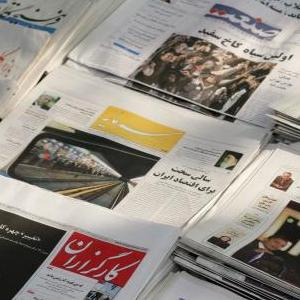Tehran's Daily Newspaper Review

Six years after the advent of Islam, the seniors of Mecca decided to ostracize the converts to curb the increasing influence of the new religion. Upon a pact between Arab chieftains of the city, Meccans were banned from mingling with the Bani Hashem, Prophet Muhammad’s tribe, or doing any trade with them. The Hashemites were forced to leave the city and dwell under tough living conditions in a valley called Shib Abi Talib for two years. But history will not repeat this time, Ayatollah Khamenei assured the people of Qom, who met with him yesterday. And amid toughening sanctions, the Supreme Leader of the Revolution stated that if anything were to be repeated, it would be the battles of Badr and Kheybar, Muslims’ victorious battles against the polytheist tribes of Mecca and the Jewish clans of Medina. Ayatollah Khamenei also addressed the upcoming parliamentary elections, predicting an “enemy-crushing” turnout by Iranians. These remarks dominated the front pages of Tehran's newspapers today.
Iran’s top headline focused on the Supreme Leader’s call for “clean, competitive elections.” Ayatollah Khamenei asked the participants to distinguish between competition and slander and avoid making unreal promises to attract votes. The candidates should not be linked to power and wealth loci and should not misuse the public budget, he stipulated. In an interview with the newspaper, Sowlat Mortazavi, the official in charge of handling the elections, denied “politically-motivated rumors” of his dismissal on the verge of the parliamentary poll, as claimed by some Principlist media.
Jomhouri-ye Eslami reported of “the West’s and the US’ confusion over boycotting and dealing with Iran,” quoting a number of supportive remarks by Western officials. The newspaper also reported of the disagreement between Majles and the government over the latter’s decision to cut off well-off citizens from the cash subsidies, as the parliament deems the decision against the law. Iraq is quite distant from peace and security, the newspaper’s editorial asserted, as chain bombings “backed by Washington” have rocked the country.
Kayhan reported of united calls for the trial of Ali Abdullah Salehi across Yemen. “Western and Asian media: European and Japanese citizens have to pay for Iran sanction” also appeared on the front page. The Arab League delegation’s report on Syria, attributing the unrest to armed dissidents, found a happy place on the upper fold. The Revolution Court’s death sentence issued for ex-US Marine soldier Amir Hekmati was also covered by the newspaper.
“People do not give a chance for maneuver to the Fetneh-perpetrators in the elections,” Resalat quoted senior cleric Grand Ayatollah Nouri Hamedani. The newspaper also featured a piece by Saleh Eskandari, who, in an atypically harsh tone, called the pro-boycott groups “underlings of the infidel” who will only harm themselves by abstention from voting. The newspaper’s editorial elaborated on Ayatollah Khamenei’s stipulations for parliament candidates.
Shargh reported of the government’s economic team visiting Latin American countries in the accompaniment of Mahmoud Ahmadinejad as the domestic market is fretting over the fluctuating exchange rate of the US dollar. The newspaper also reported of secret USD deals in the secluded alleys of Ferdowsi district, the heart of Tehran's foreign currency exchanges, as moneychangers have hoarded their dollars to sell them at the maximum exchange rate. Shargh also reported of the likely detention of a deputy of the Minister of Industry on charges of connection with the Deviant Current, as the official had failed to show up to a parliamentary meeting to which he was invited on Sunday night.
* Notes:
The editorial section of Iranian newspapers is not the work of the editor-in-chief or the senior editorial staff of the newspaper by default, but can be a contribution by experts and politicians (typically agreeing with the newspaper’s political stance.) The newspapers may also occasionally publish without an editorial.
Vatan-e Emrooz daily does not publish on Thursdays.
Trouble with understanding some terms? Check our Glossary of Iranian Political Terms.
Briefing
Iran is the official organ of the administration. Its current editor-in-chief is Ali-Akbar Javanfekr, former media advisor to President Mahmoud Ahmadinejad.
Jomhouri-ye Eslami (The Islamic Republic) was known as the official organ of the Party of the Islamic Republic, founded in 1979 and disbanded in 1987. Currently, it is an open critic of Mahmoud Ahmadinejad's policies and is known to be a mouthpiece of Akbar Hashemi Rafsanjani.
Kayhan (Universe) is a hard-line conservative newspaper. Its editor-in-chief –currently Hossein Shari’atmadari- is directly appointed by Iran's Supreme Leader. Shari’atmadari’s editorials often spark off controversy and debate inside Iranian political circles.
Resalat (Mission) belongs to the moderate wing of the Principlist camp. Resalat’s best known analyst is Amir Mohebbian, its political editor.
Shargh (East) is a moderate Reformist newspaper. It was the most popular and influential Reformist newspaper in its first period of publication which lasted from August 2003 until September 2006.
Tehran-e Emrooz (Tehran Today) is a “Principlist/Reformist” newspaper, connected to Mohammad Baqer Qalibaf, Tehran Mayor and a likely candidate of the 2013 presidential election.
Vatan-e Emrooz (Motherland Today) is a supporter of the president’s policies.

